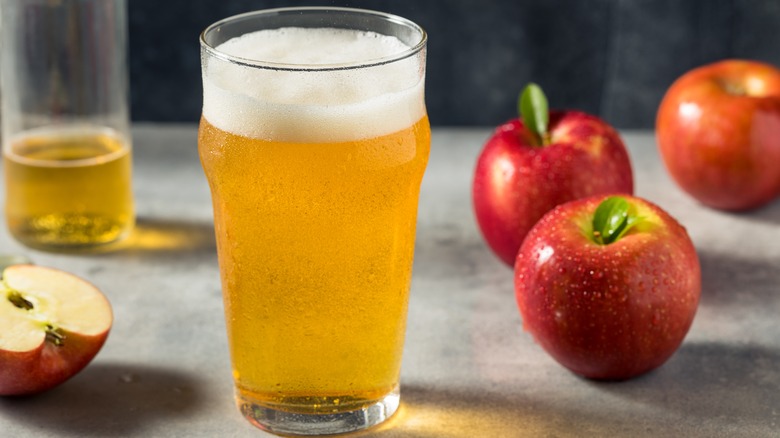What Type Of Apples Are Used To Make Hard Cider?
Apples evoke feelings of corn mazes, fall weather, and spooky decor. This is made all the better with a glass of refreshing cider in your hand. With the right apple cider ingredients, the beverage is something you can enjoy even at home. And what is even better than apple cider? Hard cider. Nothing compares to the crisp tartness of some of the best Angry Orchard flavors. To perfect the beverage, the correct combination of apples is required. Each flavor profile is determined by the type of taste that you are looking for. The four main groups are sweets, sharps, bittersweets, and bittersharps. Choosing the right apples is instrumental in creating these specific flavor profiles.
The experts agree that a mix of different apples is the best way to cultivate a profile with depth. While it is certainly possible to make hard cider with just one type of apple, it isn't advised. Using just one variety can result in an overly sweet concoction with no underlying taste. Adding up to three varieties of apples will provide a more precise flavor. Cider mills use the four categories to determine what side of the taste spectrum the cider will fall on. And to do that, they choose specific apples from each category.
The best apples for hard cider
When determining which taste profile the apples belong to, mills take both acid and tannins into account. Wine enthusiasts understand — more than anyone — the importance of tannins in their drink of choice. Occurring naturally in the environment, tannins provide texture to alcohol. The more tannins in the drink, the more present the mouthfeel. Similarly, acid is the key ingredient in many recipes and affects the sour or tart flavor of cider.
For a sweeter cider, mills use apples that have low acid and low tannins. Apples best for this are your common apples found at the grocery store. Galas and Honeycrisps are notable for their sweetness and are an inoffensive choice for sweet cider. Bittersweet apples are low in acid but high in tannins. Apples such as Dabinett and Chisel Jersey will offer a dry taste that is not too tart. For those who don't enjoy a dry cider, sharp apples are the way to go. Harrison apples are crab apples, but ideal for cider making. Americans have been using this apple to make cider for centuries, and it will result in a drink that is tart but low in tannin levels. Bittersharp apples are perhaps the most challenging because they are high in tannins and acid. With the wrong combination, this could be quite an overpowering taste. Kingston Black apples are a popular variety used for this purpose.
Cider makers are branching out with their apples
Traditionally, hard cider is milled on a grand scale. Only needing fruit juice and yeast during the fermentation process, it is quite simple to make cider. However, there is a new push from hard cider makers to get different types of apples and produce them on a smaller scale. NPR spent time with Big Fish Cider Co.'s Kirk Billingsley, one of these figures. He is trying something different from purchasing apples with a high sweet flavor profile. Instead, Billingsley is a new breed of vintage cider makers, diverting from the tried and true formula. He (among other smaller mills) is testing the waters with different kinds of apples and fermentation. Michelle McGrath with the American Cider Association informed NPR that these smaller companies are showing substantial growth. Billingsley is among many professionals who take apples from the wild to experiment with new formulas.
"We'll spread tarps under these wild trees and shake them out," Billingsley explains, hoping that the livestock doesn't get to the prized morsels first. This process differs from the typical way because no wild tree produces the same type of apple, and this yields varying tastes when it comes to their ciders. This new wave of tart ciders may just be the next big thing in the industry.


